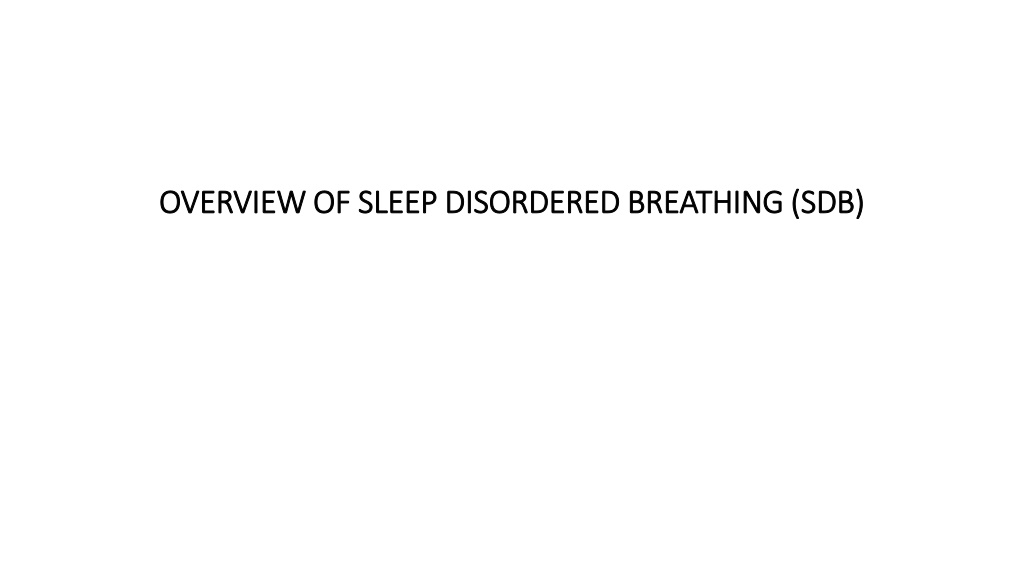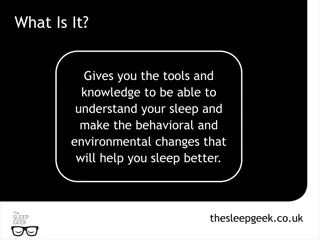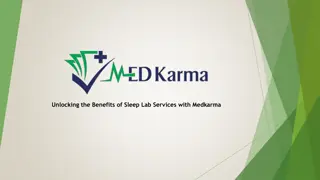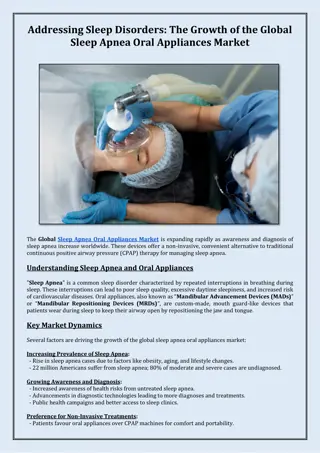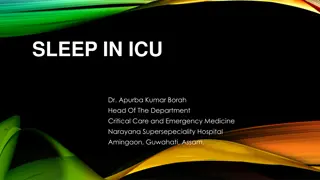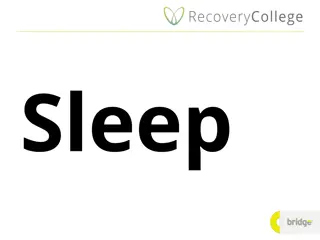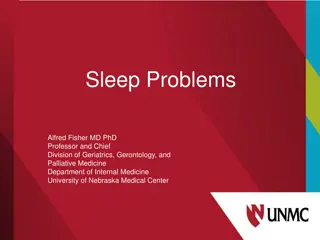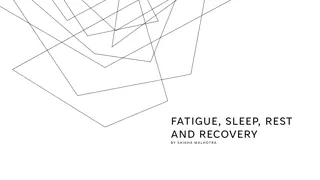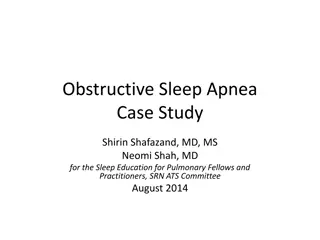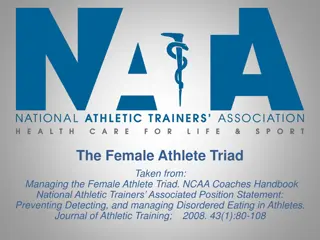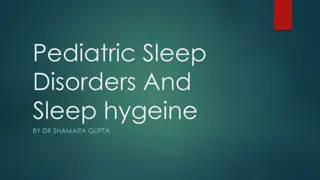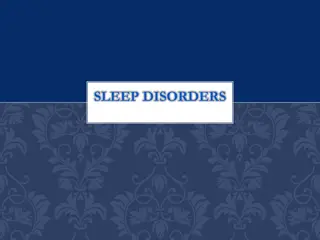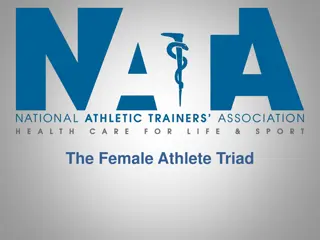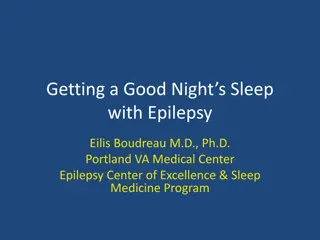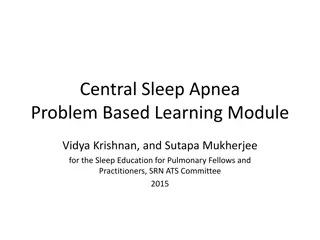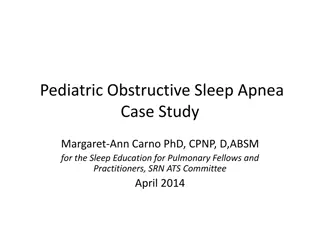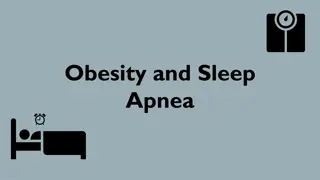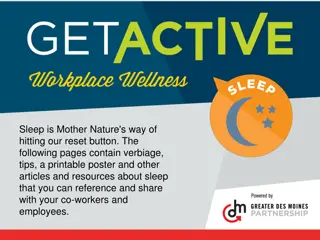Understanding Sleep Disordered Breathing (SDB) and Sleep Apnea
Sleep Disordered Breathing (SDB) encompasses various breathing difficulties during sleep, including Obstructive Sleep Apnea (OSA) and Central Sleep Apnea. These disorders can lead to serious health issues but are manageable. OSA, a common type of SDB, poses risks to cardiovascular and cerebrovascular health but can be addressed effectively. The prevalence of sleep apnea is higher in men and increases with age, affecting a significant portion of the population, often without their knowledge.
Download Presentation

Please find below an Image/Link to download the presentation.
The content on the website is provided AS IS for your information and personal use only. It may not be sold, licensed, or shared on other websites without obtaining consent from the author. Download presentation by click this link. If you encounter any issues during the download, it is possible that the publisher has removed the file from their server.
E N D
Presentation Transcript
OVERVIEW OF SLEEP DISORDERED BREATHING (SDB) OVERVIEW OF SLEEP DISORDERED BREATHING (SDB)
Some Pertinent Questions Some Pertinent Questions 1. Do you snore while you sleep? 2. Is it your nature to just snore? 3. Are you a light sleeper? 4. Who has ever fallen asleep while driving? 5. You cannot stay without falling asleep during meetings! 6. Whose child has a behavioural problem or coping poorly in school? 7. Whose blood pressure/blood glucose level remains high despite adequate and good adherence to therapy?
Sleep Disordered Breathing (SDB) Sleep Disordered Breathing (SDB) Sleep disorders that involve difficulty in breathing during sleep are classified as sleep related breathing disorders Types: Obstructive Sleep Apnoea (OSA) Central Sleep Apnoea Others
What is sleep apnea? What is sleep apnea? "Apnea" literally means "no breath" or "stopping breathing" Obstructive sleep apnea - is a clinical disorder marked by frequent pauses in breathing during sleep usually accompanied by loud snoring Central sleep apnea - a group of sleep-related breathing disorders in which respiratory effort is diminished or absent in an intermittent or cyclical fashion during sleep
Obstructive Sleep Apnea (OSA) Obstructive Sleep Apnea (OSA) OSA is a major public health issue Prevalence is increasing due to obesity pandemic and aging population Is not a life-threatening condition in itself But it can result in serious problems such as cardiovascular and cerebrovascular diseases OSA can impact on the quality of life But can be easily managed
How Common is Sleep Apnea? How Common is Sleep Apnea? Overall population prevalence ranged from 9% to 38% (higher in men) It increases with increasing age In some elderly groups, it is as high as 90% in men and 78% in women Many people have sleep apnea, but may not even know it So it's more common than you might think
YES! YES! Paediatric obstructive sleep apnea - is a sleep disorder in which your child's breathing is partially or completely blocked repeatedly during sleep Due to narrowing or blockage of the upper airway during sleep
Sleep Apnea Sleep Apnea - - Symptoms & Risk Factors Symptoms & Risk Factors Snoring. ... Frequent breaks or pauses in breathing. ... You're Tired all the Time. ... You frequently wake with headaches. ... You Have High Blood Pressure. ... You are overweight or obese. ... You are often irritable, depressed, or experience mood swings
Other Other symptoms of sleep apnea include symptoms of sleep apnea include Choking or gasping sounds Daytime sleepiness or fatigue Unrefreshing sleep Insomnia Morning headaches Nocturia (waking during the night to go to the bathroom) Difficulty concentrating Memory loss Decreased sexual desire
Common risk factors for sleep apnea include Common risk factors for sleep apnea include Excess weight Large neck size Middle age Male gender Hypertension Family history
Sleep apnea can occur in slim people too! Sleep apnea can occur in slim people too!
Sleep Apnea Sleep Apnea - - Risk Factors Risk Factors In adults, certain physical features or body types can make a person more likely to have sleep apnea Small lower jaw A prominent overbite A short, large neck Nasal breathing obstruction Very crowded teeth smaller air passage at the back of the throat
Sleep Apnea Screening Sleep Apnea Screening Have you been told that you snore loudly on most nights? Yes No Not Sure Have you been told (or noticed on your own) that you stop breathing or struggle to breathe in your sleep? Yes No Not Sure Are you tired, fatigued or sleepy on most days? Yes No Not Sure Do you have acid reflux or high blood pressure (or use medicines to treat either of these conditions?) Yes No Not Sure Are you overweight? Yes No Not Sure
Please Remember! That questionnaires are screening tools only and cannot replace a thorough history and physical or objective sleep laboratory evaluation
Sleep Apnea Sleep Apnea - - Treatment Treatment CPAP (Continuous Positive Airway Pressure) Oral Appliance Therapy Surgery Weight Management Positional Therapy Lifestyle Changes (Cognitive Behavioral Therapy, quitting smoking, no alcohol use)
FOR CLEARITY SAKE! FOR CLEARITY SAKE! Sleep related groaning, also called catathrenia, causes you to groan vocally while you sleep The cause of sleep related groaning is not known It is not related to any problem with breathing There is also no abnormal brain activity involved A physical exam tends to show no related medical cause There also does not appear to be any link to mental disorders
THE SLEEP TEAM THE SLEEP TEAM Dental Sleep Expert E.N.T Surgeon Paediatric Sleep Physician Sleep Nurse Sleep Respiratory Therapist Adult Sleep Physician (Pulmonologist, Neurologist, Psychiatrist)
Some Pertinent Questions Some Pertinent Questions 1. Do you snore while you sleep? 2. Is it your nature to just snore? 3. Are you a light sleeper? 4. Who has ever fallen asleep while driving? 5. You cannot stay without falling asleep during meetings! 6. Whose child has a behavioral problem or coping poorly in school 7. Whose blood pressure/blood glucose level remains high despite adequate and good adherence to therapy?
